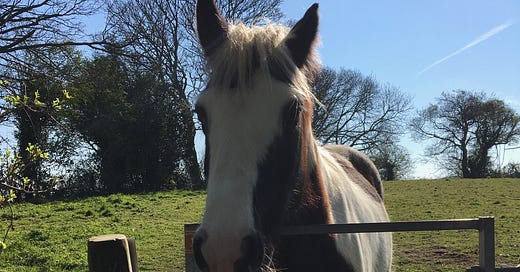One of the Stories I Know About My Grandfather
a new poem and some thoughts on the sculptural quality of narrative verse
I like poems that tell a story, whether it’s an epic tale of adventure and romance like “The Highwayman,” a quiet description of a ride in the snow, like Frost’s “Stopping By Woods on a Snowy Evening,” or Billy Collins’ imagined story of the mouse who struck a match in “The Country.” Perhaps I have pedestrian taste, but I just love a narrative.
Any of those poems I mentioned might have been longer. “The Highwayman” could be a whole novel if it wanted to be, and I can easily imagine Frost or Collins spinning those tales into much lauded short stories. But I always think of a narrative poem as a kind of sculpture. What starts as the solid block of a story gets carved away, slowly and carefully, until its shape changes and you can see a bit of light through it here and there. I think telling a cohesive story with poetry like Collins, Frost, and Tennyson, takes real skill and an artist’s eye for form.
Below is a poem about my grandfather, my mother’s father. He died when I was four so I didn’t really know him at all. I’ve always tried to balance my impression of him as quiet and reserved, with the stories I’ve heard of a younger man who acted heroically on more than one occasion.
I’ve been tinkering with this one for a while. I started playing with repetition in it, almost a kind of refrain, because I got to thinking of the old tales that traveling bards would tell by the fireside, somewhere between a story and a song. I’m not sure it’s done yet, but I reached a point with it where I thought it would be fun to share and get your feedback.
One Of The Stories I Know About My Grandfather
He started running when he heard it,
not toward the sound, but away
The rattle of a runaway wagon,
horses hooves, a woman's scream
He ran so they would catch him
already in motion, and he could
leap to the back of the closest
horse from a run, not a standstill
It sounds mad, both the doing
and the planning, but my son
the engineer would tell me it was
the most logical thing to do
He'd seen her arrive on the trolly,
home from school, a big trunk
full of clothing and books
Her father hefted it onto
the back of the wagon
as my grandfather walked by
on his way home from the mill
Afterward, folks wondered if
it was lifting the trunk that brought on
the heart attack that killed the man
His daughter screamed as her
father toppled forward, spooking
the horses, dropping the reins.
He started running when he heard it
not toward the sound but away,
so they would catch him
already in motion, and he could
leap to the back of the closest
horse from a run, not a standstill
Over his own pounding feet
and heavy breath, he heard
the wagon approaching from behind
and when the horse’s nose appeared
in the corner of his eye, he leapt,
grabbing harness and mane,
and pulled himself up
He found the trailing reins,
spoke softly into the horse’s ear,
and brought the wagon to a stop
just feet before the long downhill
to the river
He walked the river road every day,
lived along it his whole life
I wonder how often he thought
about that day on walks home,
if it ever frightened him
to think what he’d done
He started running when he heard it,
not toward the sound
but away
The February Poetry Adventure, hosted by the generous and talented
, wrapped up last Friday. If you haven’t had a chance to read some of the wonderful prompt responses yet, here is a good jumping off point:The Public Domain Poetry Project has been going on for nine weeks now. If you’d like to see what we’re doing, this is a good place to start.
Thanks for reading, everyone!






This is such an interesting story! And your two opening lines and their repetition is great.
this is such a great story and it works so well. The repetition gives it so much energy. I love narrative poetry but it has to be honed, as you say, like a sculpture so some light can get in. You've done that here.